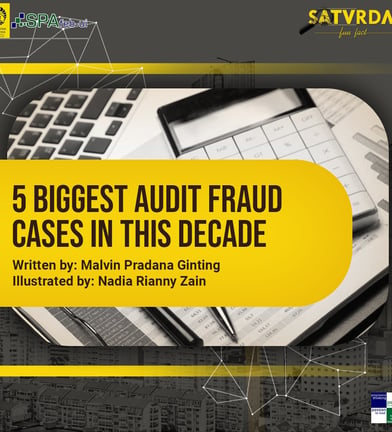Ever since the beginning of the decade, the world of accounting has already made its records on scandalous cases, furthermore the major ones. In big companies, these severe cases are not openly and directly found. People who "play" behind the case have been preparing an abundant preventive plan to minimalize the worst case that would happen later on. One of the ways to disassemble the case is by doing an audit process.
As we know, an auditor's prime function is to evaluate and investigate almost every single transaction that occurs in an ongoing business. That is why an actual auditor must have high integrity. The reality does not rule out the possibility that an auditor could be one of the "actors of that game". As a result, here are the five biggest audit fraud cases revealed in this decade.
1. Enron Scandal (2001)
Enron Corporation was an American energy, commodities, and services company based in Houston, Texas. Enron Scandal was an audit fraud case involving this corporation in 2001, to be exact in October. It was revealed at the end of 2001 that Enron's reported financial status resulted from accounting fraud. An audit found that the company hid billions in bad debts by abusing accounting loopholes while inflating its earnings. It showed that this case had been sustained by an institutionalized, systematic, and creative plan. As a consequence of this scandal, Enron's share price collapsed from almost $90 to under $1 within a year, losing shareholders over $74 billion. In an SEC investigation, Geoff Skillings and his predecessor, Ken Lay, were exposed for keeping billions of dollars of debt off the company's balance sheet. Moreover, they pressured the audit's company, Arthur Andersen, to ignore that enormous issue. Enron eventually declared bankruptcy due to the scandal, and Arthur Andersen subsequently dissolved.
2. WorldCom Scandal (2002)
Located in Ashburn, Virginia, the USA's second-largest long-distance telephone company at that time, WorldCom was an American telecommunications company that got caught doing audit fraud. Just one year after the Enron scandal, in 2002, a severe case was found. The investigation revealed that WorldCom had inflated its assets by almost $11 billion, making it one of the biggest accounting scandals in history. Prior to the scandal, its credit rating was junk, and its stock price had lost more than 94 per cent of its value. Fraud, conspiracy, and filing false documents led to the sentence of 25 years in prison for Chairman and CEO Bernie Ebbers. More than 30,000 jobs were lost due to the scandal, and investors lost more than $180 billion.
3. Tyco Scandal (2002)
Tyco International was a major global security systems company based in Princeton, New Jersey. A scandal was uncovered when the SEC and the Manhattan district attorney conducted investigations into certain questionable accounting practices at the company. The case of Tyco International's corporate scandal of 2002 focuses on the problem of unethical business practices and related issues. A former CEO and chief financial officer of Tyco International Ltd. have been indicted for racketeering by regaining $600 million through stock fraud, unauthorized bonuses, and falsified expense accounts. In this business case, an entire organization could be brought to its knees by ethical problems.
4. HealthSouth Scandal (2003)
HealthSouth Corporation is one of the top publicly-traded healthcare companies in the United States. It is based out of Birmingham, Alabama. HealthSouth's CEO, Richard Scrushy, had previously been under investigation by the SEC after selling $75 million in stock the day before the company reported a huge loss. Then, in 2003, it was discovered that the company had inflated earnings by over $1.8 billion. In order to meet the expectations of stockholders, Richard Scrushy allegedly directed employees to report grossly exaggerated company earnings.
5. Freddie Mac Scandal (2003)
The Federal Home Loan Mortgage Corporation (FHLMC), colloquially known as Freddie Mac, is a publicly-traded, government-sponsored enterprise (GSE), headquartered in Tysons Corner, Virginia. In 2003, it was discovered that Freddie Mac had misstated over $5 billion in earnings. An Office of Federal Housing Enterprise Oversight settlement in 2003 fined Freddie Mac a then-record $125 million for accounting errors caused by management misconduct. In addition, four former executives at the government-sponsored company also paid a total of $515,000 in civil fines and made restitution totalling $275,548 in settlement of negligent conduct charges. Based on the data above, the biggest accounting scandals were recorded around 2000-2003. This shows that nowadays, such large cases have decreased significantly. It is likely the result of strict regulations and the ability to log fraud made possible by advances in technology. More than that, this is undoubtedly affected by the core values that auditors always uphold.



